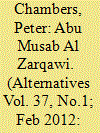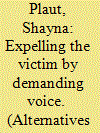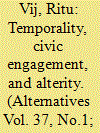| Srl | Item |
| 1 |
ID:
112753


|
|
|
|
|
| Publication |
2012.
|
| Summary/Abstract |
On June 7, 2006, Abu Musab al Zarqawi, the United States' 'public enemy number two', was killed by two 500lb bombs, dropped by US forces on the safe house in which he and others were hiding. This paper is about the making and unmaking of Al Zarqawi as a monster, and his curious afterlife as a governmental technology. As we pass the fifth anniversary of his death, this detailed study of Al Zarqawi offers an invaluable general lesson for the political analysis of terror. Zarqawi's monstration - his making and unmaking as a monster - tells us about the powers of naming and linking that characterize executive power in the age of globalized media systems, and the productive relation between diurnal practices of security work and the nocturnal phantasms of cultural memory carried by media which, this paper argues, drive and sustain wars in the twenty-first century.
|
|
|
|
|
|
|
|
|
|
|
|
|
|
|
|
| 2 |
ID:
112755


|
|
|
|
|
| Publication |
2012.
|
| Summary/Abstract |
Religion has been used by many scholars as an analytical category and an independent variable to account for the variances in governance and political violence. Very often, religion is decontextualized, resulting in confusions about the character of specific faith traditions. This article suggests an alternative framework by looking at the conceptualization and possible operationalization of the concept of public theology. In cases where "religion" might be conceptually ambivalent, a public theology framework with substantive, spiritual, spatial, and temporal dimensions can provide a sounder theorization of peaceful/violent or exclusive/inclusive strands of faith traditions and the relationship among them. Focusing on manifestations and public understandings instead of the religion itself, it also relieves political analysis from sensitive questions about what religious texts say and how traditions should be represented.
|
|
|
|
|
|
|
|
|
|
|
|
|
|
|
|
| 3 |
ID:
112754


|
|
|
|
|
| Publication |
2012.
|
| Summary/Abstract |
This article traces how Roma are crafting and changing their representation in the media and thus discursively moving from passive victims to active subjects by engaging in strategic framing and advocacy. I focus on public discussions of the French expulsion of Roma in the summer of 2010. The nature of the coverage and the engagement of Romani voices mark a shift away from the traditional trope of Roma as criminal, victim, or absent. This is part of a shifting process where Roma use media as a political tactic, even to mobilize transnationally as a subaltern counterpublic. This article demonstrates how the tactic of counterframing is employed within Romani and mainstream English-language media and how Roma engage in media activist strategies to shift the frame away from demands for Roma to prove their worth as humans to the need for members of the European Union to prove they are not engaged in systemic economic, political, and social human rights abuses.
|
|
|
|
|
|
|
|
|
|
|
|
|
|
|
|
| 4 |
ID:
112752


|
|
|
|
|
| Publication |
2012.
|
| Summary/Abstract |
Recent studies of civic engagement with ethnic others have attempted to rethink the ground of liberal multiculturalism by locating the migrant in coeval, not differential, time. Based on an ethnographic study of subcontinental migrants (Indo-kei) in contemporary Japan, this article draws attention to the limits of claims of coevalness, specifically its inadvertent reinscription of identitarian thought. Drawing on Kojin Karatani's notion of the "borromean rings" of capital-nation-state, and the multiple times associated with each, the article tracks the figure of the Indo-kei within a fluid terrain of social relationality through the varied sites and spaces of capital, nation and state in twenty-first-century Japan. This enables a more nuanced understanding of the borders/lines/distinctions that shape the migrant's journey through multiple zones of civic engagement/disengagement in different locales.
|
|
|
|
|
|
|
|
|
|
|
|
|
|
|
|